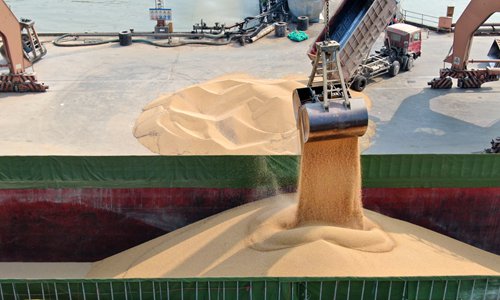HOME >> BUSINESS
China halts purchase of US agricultural products amid escalating trade war
Source:Global Times Published: 2019/8/6 10:03:20

Photo: IC
Chinese companies have halted purchasing US agricultural products after the Trump administration threatened to impose 10 percent tariffs on $300 billion worth of Chinese imports, Ministry of Foreign Affairs spokesperson Hua Chunying said on Tuesday.
Halting buying the US farming goods is a "very appropriate" retaliation from the Chinese side as cooperation must proceed in a friendly and fair environment, said Dong Shaopeng, an advisor for the China Securities Regulatory Commission on Tuesday morning.
The US has again sent an "adverse signal" to the China-US trade talks, one expert said, emphasizing that the two countries' cooperation and communication must be based on the premise of equality.
The possibility also exists that China could increase tax on US agricultural products bought after August 3, Hua noted.
"China hopes that the US can well-implement the consensus the two countries had reached during the G20 meeting in Osaka, keep their promises and create necessary conditions for the two countries' agricultural cooperation," Hua said.
She also stressed that China, with its huge market, has bright prospects for importing high quality agricultural products from the US in the future.
Trading of farming products like soybeans has been a core issue of the China-US trade negotiations. Recently, many Chinese companies were in the process of making new purchases of US agricultural products such as soybean, cotton and pork. Several deals had been reached already, Ministry of Commerce spokesperson Gao Feng disclosed on August 1.
"China has shown an active attitude with the recent move to buy US farming goods, but the US also needs to show a positive attitude. But they didn't, considering their recent tariff-hike threats. What they did thwarted the proceedings of the trade negotiations," Bai Ming, a deputy director of the International Market Research Institute of the Chinese Ministry of Commerce, told the Global Times on Tuesday morning.
Dong also said that cooperation can't last when China is making efforts to benefit the trade talks while the US is creating obstacles.
Global Times
RELATED ARTICLES:
Posted in: MARKETS